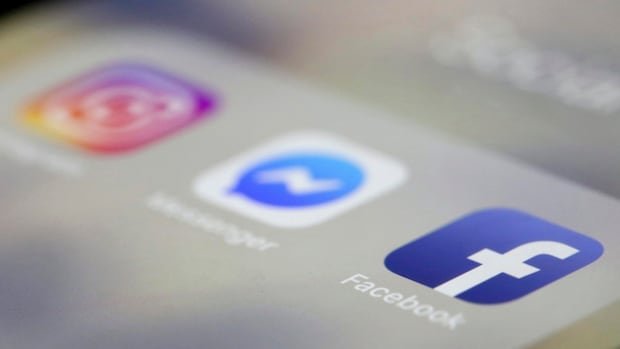Canadian groups that study and advocate for free expression have mixed feelings about Meta’s changes to what is automatically considered “hateful” behavior on social media platforms like Facebook and Instagram, as advocates for 2SLGBTQ+ people and women flag concerns about terms like “whore” allowed.
“We are getting rid of a number of restrictions on topics such as immigration, gender identity and gender that are the subject of frequent political speeches and debates,” wrote Meta’s Joel Kaplan, the company’s director of global affairs.
The company recently changed its hateful conduct policy to state that users can now explicitly compare “gender or sexual orientation” to having a mental illness or being abnormal, when previously this was not allowed.
Meta still prohibits comparing other aspects of a person’s identity with a mental illness.
The company also removed an explicit restriction on referring to women as property or objects, and removed the words “whore,” “slut,” and “perverts” as restricted terms.
Meta representatives declined an interview request from CBC News, but said it’s important to keep in mind the differences between offensive speech and speech that can lead to violence, and that the company does not believe its role is to regulate what It’s offensive.
“What started as a movement to be more inclusive… has gone too far. I want to make sure people can share their beliefs and their experiences on our platforms,” said Meta CEO and Facebook co-founder Mark Zuckerberg. , in a video published on January 7.
Changes will have ‘negative consequences’, charity says
Reaction from groups representing some of the affected groups in Canada was swift.
The gay-focused charity It Gets Better Canada has said it had anecdotally already noticed a large number of what it called “hate comments” on Facebook, and is concerned things could get worse given Meta’s new policy.
“These new policy changes are going to have negative consequences for 2SLGBTQ people who use social media,” It Gets Better Canada executive director Omid Razavi said in an interview with CBC News.

He noted that, for many young people, social media has been one of the only places they can communicate about their identity, and explicitly allowing queer youth to be called abnormal or mentally ill could have negative results.
“What should be, or what used to be, a safe space to share information, raise awareness and build community is really going to move into a downward spiral,” Razavi said.
He believes that codes of conduct are important ways to signal that an online community is for everyone, and that Meta’s decision to remove restrictions that explicitly apply to gay, lesbian, bisexual and transgender people could also send a message that perhaps those groups are less welcome. .
“Knowing that there are certain guidelines and whether people choose to follow them or not, at least creates that sense of hopeful barrier or responsibility, or at least a moral foundation that the platform you’re on wants you to respect,” Razaví said.
“Eliminating them completely really speaks volumes.”
Meta, the parent company of Facebook and Instagram, is getting rid of fact-checkers on the platforms and will instead rely on users to comment on accuracy, but experts warn the move will likely increase the spread of misinformation. .
James Turk, director of the Center for Free Expression at Metropolitan University of Toronto, also believes Meta’s move could be harmful.
“Allowing insults to LGBTQ people, claiming that they have mental illness, without allowing it against anyone else, makes it possible to… amplify and spread that and make it more part of the discourse,” Turk said.
He noted that while it does not violate Canadian laws against hate speech, the posts now allowed by Meta are “certainly hate speech.”
The ‘mixed feelings’ of the civil liberties group
“Social media users should be able to express themselves freely online, and that means being able to post dissenting, unpopular or unpleasant opinions,” said Anaïs Bussières McNicoll, director of the Fundamental Freedoms Program at the Canadian Civil Liberties Association (CCLA).
The CCLA is an organization that advocates for freedom of expression as part of its civil liberties lobbying work in Canada. The group says it is pleased to see a social media giant prioritizing free speech.

That said, McNicoll says his organization has “mixed feelings” about Meta’s recent announcements.
“We view favorably the renewed commitment to freedom of expression, but we are also concerned about some of the specific changes made by Meta, especially from an equality perspective,” McNicoll said.
“What Meta did in its hate conduct policy was create exceptions, specifically allowing certain types of hate speech if it is based on gender or sexual orientation,” he said.
“So Meta appears to be targeting specific groups that are already vulnerable, namely women and members of the 2SLGBTQ+ community.”
Advertisers may have concerns
Advertisers may be concerned about their messages appearing next to negative posts referring to women or queer people with insulting language, due to the number of companies advertising on Facebook and Instagram.
“Meta is a powerhouse,” said Tod Maffin, host and editor of the podcast and newsletter. Today in digital marketing. “Advertisers have a lot to worry about here.”
This is, at least in part, because it might be difficult to block an ad for, say, laundry detergent from appearing in a publication that calls young lesbians mentally ill.

Maffin noted that in his experience, the tools advertisers use to restrict and control where their ads appear often don’t work as promised. His own podcast tried to avoid being associated with gun content.
His own podcast tried to avoid being associated with gun content, but then received a message from a listener asking if he knew ads for gun silencers were appearing on the show. “It turns out that they had grouped that ad not in the weapons category, but in the hunting category, which we did not do,” he explained.
Maffin noted that it will take time to see if marketers decide to leave due to these changes, and that will depend on how (and if) many users leave Facebook and Instagram as a result.
“The brands that are on the progressive side will leave and then the rest of the market will wait,” he said.
Concerns have been brewing for months, says Calgary activist
Calgary-based 2SLGBTQ+ activist, drag performer and academic Victoria Bucholtz says she started to feel like there was less corporate support for her communities in the spring of 2024, and hints that was the start of the policy changes coming. they observe today.
“As someone who organizes a lot of Pride events, I noticed a noticeable reduction in the number of Pride events sponsored by larger corporations. They didn’t like receiving negative attention for their charitable actions around Pride,” said Bucholtz, a trans woman. who has a PhD in history and teaches at Mount Royal University in Calgary.

She also regularly hosts “Story with a Drag Queen” events outside of her university job, under her stage name, Karla Marx. In this context, she regularly uses social networks to promote and publicize events that involve other women and other queer people. She says these rule changes could drastically affect how other users can interact with your posts.
“Unfortunately, on those Meta platforms, particularly Instagram and Facebook, we found a lot of traffic,” she said, but noted that many women who used social media faced a frustrating experience even before Meta’s recent changes.
“If you look at the way these platforms treat strippers, sex workers, burlesque performers and anyone on that spectrum, it’s very, very dangerous,” Bucholtz said.
The difference for her is that now, Meta’s hateful conduct policy can be interpreted in so many ways that it makes it “arbitrary.”
“If you want to look at those policies and say, well, you can’t really insult anyone with too many naughty names, you can say that. And if you want, you can say, ‘Actually, I can call a woman a whore.'” And a bitch because I’m allowed to do that too. “
Bud Light’s hiring of trans influencer Dylan Mulvaney sparked a conservative backlash, but the company’s handling of that backlash sparked even more criticism from the 2SLGBTQ+ community.
But Bucholtz also says that negative language, particularly toward women, was already common on Meta platforms. It is possible that these changes simply remove previous protections that, to her, were just an illusion, in the sense that Meta did not consistently take predictable actions when previous policies were violated.
“To use a mocking metaphor, this is the kind of final stripping of the last veil,” he said. “I mean, this is the final reveal.”









